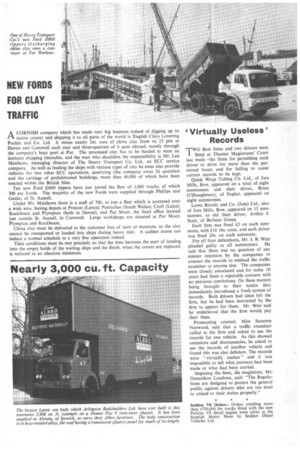NEW FORDS FOR CLAY TRAFFIC
Page 23

If you've noticed an error in this article please click here to report it so we can fix it.
ACORNISH company which has made very big business indeed of digging up its native county and shipping it to all parts of the world is English Clays Lovering Pochin and Co. Ltd. It mines nearly 2m. tons of china clay from its 23 pits in Devon and Cornwall each year and three-quarters of it goes abroad, mostly through the company's busy port at Par. The processed clay has to be hauled to meet an intricate shipping timetable, and the man who shoulders the responsibility is Mr. Len Matthews. managing director of The Heavy Transport Co. Ltd., an ECC service company. As well as feeding the ships with various types of clay he must also provide vehicles for two other ECC operations, quarrying (the company owns 26 quarries) and the carriage of prefabricated buildings, more than 40.000 of which have been erected within the British Isles.
Ten new Ford D800 tippers have just joined the fleet of 1,000 trucks, of which 300 are Fords_ The majority of the new Fords were supplied through Phillips and Geake, of St. Austell.
Under Mr. Matthews there is a staff of 700, to run a fleet which is scattered over a wide area, having depots at Preston (Lanes); Pontyclun (South Wales); Croft (Leics); Rockbeare and Plympton (both in Devon). and Par Moor, the head office located just outside St. Austell, in Cornwall. Large workshops are situated at Par Moor, Plympton and Rockbeare.
China clay must be delivered to the customer free of taint or moisture, so the clay cannot be transported or loaded into ships during heavy rain. A sudden storm can reduce a normal schedule to a very fine operation indeed.
Tidal conditions must be met precisely so that the time between the start of loading into the empty holds of the waiting ships and the finish, when the covers are replaced, is reduced to an absolute minimum.
















































































































